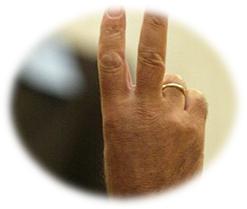A Time to Be Silent and a Time to Speak
A Time to Be Silent and a Time to Speak
Part 1: Actuality and Background of Office-Bearers’ Promise of Confidentiality⤒🔗
When they are installed into their office, pastors, elders and deacons promise to keep secret whatever confidential information will be entrusted to them. How does this work in practice? Are office-bearers aware of their responsibilities on this point? And are the members of the congregation aware of both the possibilities and the limitations of this confidentiality? In short, there are enough reasons to give some attention to the promise of confidentiality in the church.
The Dutch daily De Telegraaf announced on January 22, 2003 that many pastors and elders appear to have serious difficulties with the promise to keep secret whatever is told them confidentially in the discharge of their duties. This is especially the case when dealing with matters of sexual violence. Reacting to this news item, representative S. van Delden of the Protestantse Kerk in Nederland (PKN) said that he recognizes the difficulties among office-bearers: “During the past years there have been incidents where this promise of confidentiality became an easy way to protect perpetrators of sexual violence and to ensure that this evil could continue for years.” Anyone who follows the church news can no doubt come up with various examples.
Is silence golden?←↰⤒🔗
The proverb says: ‘Speech is silver, silence is golden.’ Yet the question remains whether silence is always the best approach for office-bearers. Don’t they run the danger of complicity when, with an appeal to their promise of confidentiality, they remain silent about crimes and abuses? Isn’t it so that by speaking they can, in many cases, prevent further evil? Think, for example, of someone who confidentially admits that he has evil plans with  respect to someone. Also in cases of addiction or psychological illnesses the question can arise whether silence is always better than speaking.
respect to someone. Also in cases of addiction or psychological illnesses the question can arise whether silence is always better than speaking.
On the other hand, there is also much to be said for silence by office-bearers about confidential information. For who dares entrust confidential material to an office-bearer if there is reason to fear that within a week the rest of the congregation will know about all the juicy details? A ‘leaking’ consistory loses the confidence of the congregation. This will seriously affect pastoral visits. Members of the congregation must be able to trust that their confidential information will be treated as such.
Consistories and other church meetings can’t avoid occasionally speaking about matters that concern the privacy of members. But how much damage can ‘leaking’ to others, or even to the press, bring about! It may interfere with an honest treatment of the issue in question or make it altogether impossible. Therefore it is important that office-bearers and members of the congregation are aware of the importance of the promise of confidentiality.
What is this promise?←↰⤒🔗
The Church Order outlines the duty of pastors in article 16. It does speak about supervising fellow office-bearers and the congregation, and it also says something about discipline and about the necessity that everything is done ‘properly and in good order.’ But nothing is said about the promise of confidentiality. In article 23 various good things are said about the service of the elders, and article 25 describes the service of the deacons. But here too there is no mention of professional confidentiality. The Forms of Ordination for pastors and for elders and deacons also do not explicitly deal with the matter of confidential information. We are told that pastors (article 4) and elders (article 22) and deacons (article 24) must be installed into their office in accordance with the proper form.
The classical forms of ordination contain no binding promise of respecting confidentiality. The revised forms of ordination (accepted by the general synod 1968/69, 1971/72, and 1974) do demand a promise of confidentiality. Pastors, as well as elders and deacons, are asked to promise ‘to treat with the required confidentiality with respect to what in your work as office-bearers has confidentially been entrusted to you.’ This description forms the starting-point in our consideration about pastoral confidentiality in our churches.
Explanation←↰⤒🔗
It is good to explain a few elements of the description a bit further. Office-bearers’ duty of confidentiality concerns information that is received in connection with the discharge of the office-bearer’s duty. Issues that are known to the office-bearer as, for example, neighbour, relative, or colleague are not automatically included. The confidentiality is limited to confidential information which one has heard in his work as office-bearer.
This confidentiality does not apply to all information, but only to what has been given confidentially. It is not always easy to draw a sharp boundary here. But it is clear that confidentiality is involved when somebody clearly asks for it, saying “I don’t want you to speak about this further,’ or ‘I tell you confidentially that…’, etc. But also when someone does not explicitly ask for confidentiality, it may be expected that office-bearers deal carefully with information about the personal life of members of the congregation.
Also, confidentiality is not a favour, but a requirement. Members of the congregation may consider it a right to expect confidentiality when they give confidential information. And for office-bearer it is a duty to respect confidentiality.
To whom does the requirement of confidentiality apply?←↰⤒🔗
It must be clear that all office-bearers who at their installation have promised to respect confidentiality must keep this promise. But there is more. Traditionally, the civil authorities recognize the duty of professional confidentiality of ecclesiastical office-bearers. In special cases, therefore, these men can in the law-court appeal to that professional secret. The civil government acknowledges and honours the confidential character of pastoral discussions. Even when no promise of confidentiality has been made, it is assumed that office-bearers can appeal to their duty in this respect.
A promise of confidentiality can also be asked of non-office-bearers – for example, of members of the congregation with a special service, such as the support of (youth) pastoral work (see Acts General Synod 2001, p.676 – of the Christelijke Gereformeerde Kerken in the Netherlands) or of mission.
The General Synod of 2001 has also dealt with the serious problem of abuse in pastoral and other ecclesiastical relationships. It was decided to establish a complaints-commission which serves as moral directive for pastors and other ecclesiastical workers.
Herein one can find a precise description of how to deal with confidential information. The main point is that there must be silence about what has been said confidentially. Without the approval of those concerned, such information may also not be made public later (for example, in memoirs). There are additional prescriptions in this code of behaviour which make clear that confidential information must be treated carefully.
Protection of the duty of confidentiality←↰⤒🔗
Careful dealing with confidential information begins with the person who has been informed of it. Acquainting others with such information is experienced as betrayal. The code of behaviour for pastors indicates that when a pastor has the habit of sharing information of his office with his wife, members of the congregation must know this. Of course, this applies also to elders and deacons. Members of the congregation must be able to count on the protection of their personal and spiritual sphere of life. The greatest possible care is required, and indiscretion is not allowed.
Respect for the personal sphere of life is a human right, which has been included in the Dutch constitution and in international treatises. The law of civil justice states in art. 165 that anyone must give witness when required by law to do so. This does not necessarily apply, however, to “those who are required to keep secrets because of their office, profession, or relationship regarding that what has been entrusted to the.” In other words, the government makes its own task heavier for the sake of professional confidentiality.
When looking back on the regulations of the church regarding professional confidentiality and the respect thereof by the civil government, we can conclude that there is sufficient room for office-bearers and other members of the congregation to deal carefully with confidential information. The question about what the Bible says on the matter remains. We will talk about that next time.
Part 2: Biblical Roots of the Office-Bearers’ Duty of Confidentiality←⤒🔗
Ecclesiastical office-bearers/workers and meetings must deal carefully with confidential information. In an earlier article we looked at the rules that have been established to ensure that the duty of confidentiality functions properly. This time we look at the biblical roots of this duty.
Office-bearer confidentiality refers to the duty of office-bearers to remain silent about confidential information. Does this duty rest on a biblical prescription, or is it just a matter of general customs regarding proper relationships? The term itself does not occur in the Bible. Nor is there any biblical guide indicating how we must deal with confidential information. But are there then no guidelines in the Old and New Testament that refer directly or indirectly to this duty of professional secrecy?
The ninth commandment←↰⤒🔗
The Lord Jesus calls Satan “a liar and the father of lies” (John 8:44). Whatever is unreliable, based on lies, or connected with deceit is totally rejected in the Bible. God is true (Rom. 3:4); he is the rock on whom people can confidently build (e.g. in Ps. 46, Ps. 84). In the Ten Commandments (Ex. 20) the God of truth, love and redemption enjoins upon his people a life of obedience, love and deliverance. One of these commandments – the ninth – protects the reputation of people: “You shall not bear false witness against your neighbour”. In daily relationships we may not blacken each other’s name with gossip, lies, and deceit. This applies also to the testimony before a judge. That must be honest and reliable. In the ninth commandment God protects the good name and reputation of the neighbour. The general guideline of the ninth commandment about a careful and loving relationship with each other applies of course also to office-bearers in their work.
In daily relationships we may not blacken each other’s name with gossip, lies, and deceit. This applies also to the testimony before a judge. That must be honest and reliable. In the ninth commandment God protects the good name and reputation of the neighbour. The general guideline of the ninth commandment about a careful and loving relationship with each other applies of course also to office-bearers in their work.
In connection with the ninth commandment we can further think of the New-Testament warning not to speak evil against each other (James 4:11; see also Rom. 1:29 ff.).
When in 1 Timothy 3:1-13 and Titus 1:5-9 Paul speaks of overseers and deacons, he indicates that overseers must be above reproach. Deacons may not be double-tongued (1 Tim. 3:8). These warnings are affirmed in the ninth commandment.
Honouring the promise←↰⤒🔗
Office-bearers promise at their ordination to keep confidential information secret. The Bible speaks clearly about the weight of such a promise. Deuteronomy 23:21-23 states that when a person makes a promise to God but delays fulfilling it, he commits a sin. Whatever has been freely promised must be promptly fulfilled (see also Num. 30:1-16).
Ecclesiastes begins with the warning not to be rash with words before God. In verse 4 there are words which resemble those of Deuteronomy 23:21-23: “When you vow a vow to God, do not delay paying it … Pay what you vow.” Ecclesiastes 5:5 adds that it is better not to make a vow at all than to promise and not to pay.
Confidential information←↰⤒🔗
Confidential information plays a special role in various biblical histories. There is, for example, the case of the midwives Shiphrah and Puah (Ex. 1:15-21) who were involved with the birth of baby boys in Israel but refused to kill them (as the Pharaoh of Egypt had ordered them). Think also of the Jewish spies whom Rahab hid in Jericho (Josh. 2:4ff), the secret meeting between David and Jonathan (1 Sam. 20), and how the secret information (Esth. 2:10) about the actual descent of Esther forms the key to the rescue of Israel. In these examples secrecy is a matter of life and death.
An additional problem becomes evident as well: keeping confidential information secret can place someone in a situation where it is just about impossible to give ‘no false witness’ (e.g., the midwives in Egypt and Rahab in Jericho). This conflict of conscience is also called a ‘white lie’. The interest of protecting life can in certain circumstances be more important than the duty of speaking the truth. In connection with confidentiality, it is also possible to reach a boundary, where other duties must be considered more important than the duty of confidentiality.
The Bible further shows that confidence can be disappointed. The history of Joseph and his brothers as told to father Jacob is full of conceit, and blackmail (Potiphar’s wife). Judas is without doubt the most harrowing example of someone who passes on information and thereby betrays his Master.
The words of Proverbs have lost nothing of their relevance: “Whoever goes about slandering reveals secrets, but he who is trustworthy in spirit keeps a thing covered” (Prov. 11:13).
No specific biblical data?←↰⤒🔗
The biblical data given above are not specifically concerned with the professional secret. They deal more in general terms with honesty and confidentiality in our relationships. Of course, this applies also to office-bearers, but is there not more to be said about the professional secret with reference to the Bible?
The Lord Jesus is the great Office-bearer. It is striking how personally and confidentially he associates with people. At night he speaks with Nicodemus (John 3). But this confidential meeting is not widely publicized, in spite of the ‘public relations’ value of an important person supporting a new spiritual movement. The Saviour appears to know everything about the failed marital life of the Samaritan woman (John 4). But he does not speak about it to the disciples (John 4:27ff.). It is the woman herself who with astonishment tells people what Jesus has told her, all that she had done (John 4:29). And there are other examples of the honesty and confidentiality wherewith the Saviour meets people. But here also it cannot be said that it is specifically concerned with the professional secret.
Special attention for Matthew 18←↰⤒🔗
The explanation of Matthew 18:15-20 occupies a special place in connection with the biblical and historical background of the professional secret. The Lord Jesus says: “If your brother sins against you, go and tell him his fault, between you and him alone” (Matt. 18:15). It is a matter here of mutual pastoral relationships, first of Jesus’ disciples, but later also of the congregation. Just as the Good Shepherd leaves the 99 sheep behind in order to seek the lost sheep (Matt. 18:12-14), so it may be expected of the Good Shepherd’s disciples. The sin of a brother results in estrangement from the Good Shepherd and his flock. The mutual correction has as aim to help  restore the stumbling brother.
restore the stumbling brother.
Someone in the congregation, it appears, has committed a secret sin. By means of a conversation with one other person he must, with love, be brought back on the right path. That is a demanding task. The fact that he has done wrong must be realized by the sinner. Then the road is free to seek together mercy and forgiveness from the Lord. It is not so that first others are informed. If the sinner confesses and shows repentance about the evil he has committed then there is nothing further to be done. No one else has to be told. The confidential information remains restricted to two persons.
A new phase follows only if the confidential reprimand has not had the desired effect. But also in this phase there is no room for a ‘public treatment’ of the issue. In that case, “take one or two others along with you, that every charge may be established by the evidence of two or three witnesses” (Matt. 18:16). The number of those concerned with the case remains as small as possible. If this second attempt also remains unsuccessful, the circle is widened further. The leaders of the congregation (in our situation: the church council) are then informed. If the sinner does not listen to the representatives of the congregation he loses his place as ‘brother’ in the congregation. He is “as a Gentile and tax collector” (Matt. 18:17).
It is striking how carefully and confidentially this pastoral problem is being treated. No more people than strictly necessary are informed of the evil that has happened. In that manner the way back for the sinner is freed from unnecessary obstacles.
Conclusion←↰⤒🔗
The Bible abounds with examples of how honesty, truthfulness, and trustworthiness as demanded in God’s commandments are realized in the relationship of people with each other. It demands some spiritual wisdom to estimate which information belongs to the sphere of confidentiality that may not be ignored. Special care is required when a brother falls into sin and correction is needed. Next time we will see further how these elements play a role in the office-bearers’ duty of confidentiality.
Part 3: Historical Roots of the Office-Bearers’ Duty of Confidentiality and its Practical Application←⤒🔗
There is no direct line from the Bible to the professional confidentiality of ecclesiastical office-bearers/workers and meetings. In an earlier article we have seen, however, that it is possible to draw general biblical lines.
The explanation of Matthew 18 is of great importance for our vision on the confidentiality of the office bearer. A look at history shows how people dealt with the topic in the past. Following that, we look at the practice of today.
 Christ says in Matthew 16:19: “I will give you the keys of the kingdom of heaven, and whatever you bind on earth shall be bound in heaven, and whatever you loose on earth shall be loosed in heaven.” According to the Roman Catholic vision, these words about the ‘power of the keys’ are directed to Peter only. After Peter’s death it was passed on to the legal successors of Peter: the popes. The pope is the supreme bishop, shepherd, teacher, governor and judge in the church. The common bishops have the power of the keys that Jesus describes in Matthew 18:18 and John 20:23. Priests, as subordinate helpers of the bishop, also possess the power to remit and forgive sins. Over the centuries this doctrine has taken a more and more definite shape and has finally been definitively established at the First Vatican Council (1870).
Christ says in Matthew 16:19: “I will give you the keys of the kingdom of heaven, and whatever you bind on earth shall be bound in heaven, and whatever you loose on earth shall be loosed in heaven.” According to the Roman Catholic vision, these words about the ‘power of the keys’ are directed to Peter only. After Peter’s death it was passed on to the legal successors of Peter: the popes. The pope is the supreme bishop, shepherd, teacher, governor and judge in the church. The common bishops have the power of the keys that Jesus describes in Matthew 18:18 and John 20:23. Priests, as subordinate helpers of the bishop, also possess the power to remit and forgive sins. Over the centuries this doctrine has taken a more and more definite shape and has finally been definitively established at the First Vatican Council (1870).
Now, it is clear that a priest, when hearing a confession, cannot do his work if he does not have all the necessary facts. Therefore, believers have the duty to inform the priest about even the most secret sins. Over against the duty of the believers stands the absolute confidentiality of the priest of whatever has been said during the confession.
In today’s Roman Catholic Church, the general duty of believers to go to confession is not very strictly applied in practice. The absolute confidentiality of the confession, however, is still observed, although here and there people suggest that this should change.
Luther and Calvin←↰⤒🔗
Martin Luther strongly objected to the idea that Christ gave the power of the keys to Peter only. He applies the words of Matthew 16:19 in the light of Matthew 18:18 to the entire Christian church. Just as the Holy Spirit was first given to the apostles (John 20:22) but later also to the entire congregation, so the power to bind and to loose was also first given to the apostles (John 20:23) and later to the entire congregation.
Luther applies his new vision on the church’s power of the keys also to his vision on the confession. He shows himself to be a strong opponent of the compulsory confession. Moreover, we do not need a pope or priest to comfort a fearful heart. Every church member can say to his neighbour: your sins have been forgiven! The authority of the Word and the faith that fully believes the Word are sufficient to participate in the comfort of forgiveness.
 Like Luther, John Calvin also denies the existence of a priestly justice system in the church with a general duty to confess (Inst. III, 4, 18). The power of the keys of Matthew 16:19, according to Calvin, belongs to the office of preaching. The door to life opens for us in no other way than by the Word of God. That is the key which Christ has placed in the hand of the preachers of the Word (Commentary on Matthew 16:19). Christ himself forgives sins. No person can do that in his place. But Christ uses the service of the apostles and the preachers of the Word to proclaim forgiveness of sins in his name.
Like Luther, John Calvin also denies the existence of a priestly justice system in the church with a general duty to confess (Inst. III, 4, 18). The power of the keys of Matthew 16:19, according to Calvin, belongs to the office of preaching. The door to life opens for us in no other way than by the Word of God. That is the key which Christ has placed in the hand of the preachers of the Word (Commentary on Matthew 16:19). Christ himself forgives sins. No person can do that in his place. But Christ uses the service of the apostles and the preachers of the Word to proclaim forgiveness of sins in his name.
Calvin, like Luther, knows of the promise of personal forgiveness as a word of comfort to those who feel the need to pour out their heart to an office-bearer.
They may be personally comforted and encouraged with words of Scripture about forgiveness by faith in Christ. The preachers of the Word apply the keys of the kingdom of heaven not only in the public proclamation of the gospel, but also in the personal pastoral conversation (Inst. III, 4, 12). Like Luther, Calvin sees in the church’s power of the keys a possibility for personal pastoral care. Calvin does not go as far as Luther, who believes that sins are actually forgiven as soon as the office-bearer proclaims, “I absolve you of your sins.” Calvin maintains that the actual forgiveness of sins is the exclusive work of God. The promise of forgiveness always has the character of a promise which must be accepted by faith. Without faith in the promise, there is no assurance of forgiveness (Inst. III, 4, 22).
Roots in the pastorate←↰⤒🔗
In the line of Calvin, the promise of confidentiality in the churches of the Reformed confession is tied especially to the pastorate. In the pastoral discussion it is necessary that the most confidential things can be raised, so that the gospel promise by the powerful work of the Holy Spirit can comfort and encourage also in personal circumstances. The office-bearer’s promise of confidentiality serves as a guarantee that the personal sphere of life is respected and makes sure that unnecessary obstacles (such as a loss of reputation) are avoided when someone has to be reprimanded.
Beginning with this pastoral discussion, the demand of confidentiality applies to all confidential information which is given to office-bearers (also, therefore, in meetings). The value of this confidentiality is evident, among other things, also by the fact that violation of the duty of confidentiality can result in ecclesiastical steps against the one who did not keep the confidentiality.
Limitations to the duty of confidentiality?←↰⤒🔗
In the first place: the duty of confidentiality is a matter of principle and must be strictly maintained. Questions about limitations, nevertheless, will arise in certain instances. For example: is a pastor allowed to speak with a colleague about confidential matters (“I am in a difficult situation and wonder if I can ask your advice as a colleague?”)?
Is it allowed in contact with experts to give information, for example to a medical doctor or a therapist (“in a pastoral discussion he complained about…”)? What must an office-bearer do with information about sexual abuse or criminal behaviour? What is to be done if an office-bearer in a pastoral situation is himself too heavily burdened and is in need of help (medical and/or psychological)?
These questions show that the duty of confidentiality can cause serious moral scruples. Such a situation demands a very careful balancing of duties and interests.
The Dutch word for secret is geheim, which is related to the word heim, which in turn means ‘home.’ The term, therefore, refers to something like: belonging to a home, trusted, not knowable to others. In this sense it is opposed to ‘publicly known’. It does not have to mean that no one knows about it. It means, rather, that those who do know something about it do not publicize it. Experts sometimes speak of a ‘black box’, which is closed to outsiders and within which information is safe.
 Within the ‘black box’ confidential information may be exchanged, but not without limits. The duty of confidentiality applies also within the ‘black box’. There also confidential information may only be used for the purpose for which it has been provided, and not, therefore, in order to satisfy the curiosity of others or to lighten one’s own psychic burden.
Within the ‘black box’ confidential information may be exchanged, but not without limits. The duty of confidentiality applies also within the ‘black box’. There also confidential information may only be used for the purpose for which it has been provided, and not, therefore, in order to satisfy the curiosity of others or to lighten one’s own psychic burden.
The duty of confidentiality limits the publicity of certain confidential information. Nevertheless, it can be important for some people or authorities to be told about the way in which a certain procedure has been dealt with. This will especially be the case when an issue has already become widely known in the public arena. In such cases a good balance must be achieved between the interest of the parties (protection of the good name and privacy), the importance of the procedure (an honest treatment), and the interest of others (the right to information). It is then to be recommended that, at the very most, only limited information is given by specially appointed persons who function as mediators.
Breaking the promise of confidentiality←↰⤒🔗
If there are situations (as indicated above) when office-bearers believe they must break the official secret, then it must be done with great carefulness. The rule of conduct for pastors and ecclesiastical workers states: “When on biblical or church-orderly grounds the care for somebody has to be shared with one or more office-bearers or with members of the congregation, confidential information may be shared. The person involved must be told about this beforehand, and the congregation must be able to know about this right.”
Important elements are: that everything possible is done to get the approval of the person(s) involved to be released from the duty of confidentiality; that there is the possibility of damage/danger if the secret is not made public; that the person(s) involved has/have been informed; and that the damage to the duty of confidentiality is kept as small as possible.
A time to be silent and a time to speak←↰⤒🔗
The title of these articles about the duty of confidentiality was inspired by Ecclesiastes 3:7. There is a time for everything, also for being silent and for speaking. The silence of office-bearers in connection with their duty of confidentiality makes it possible to speak about the most confidential matters,  so that the voice of the gospel is heard also in the most hidden places of one’s life. In that light, the promise of confidentiality is a valuable pastoral instrument which is to be used with care and compassion for the sake of the building-up of the congregation.
so that the voice of the gospel is heard also in the most hidden places of one’s life. In that light, the promise of confidentiality is a valuable pastoral instrument which is to be used with care and compassion for the sake of the building-up of the congregation.
This article was translated by Dr. Freda Oosterhoff.

Add new comment